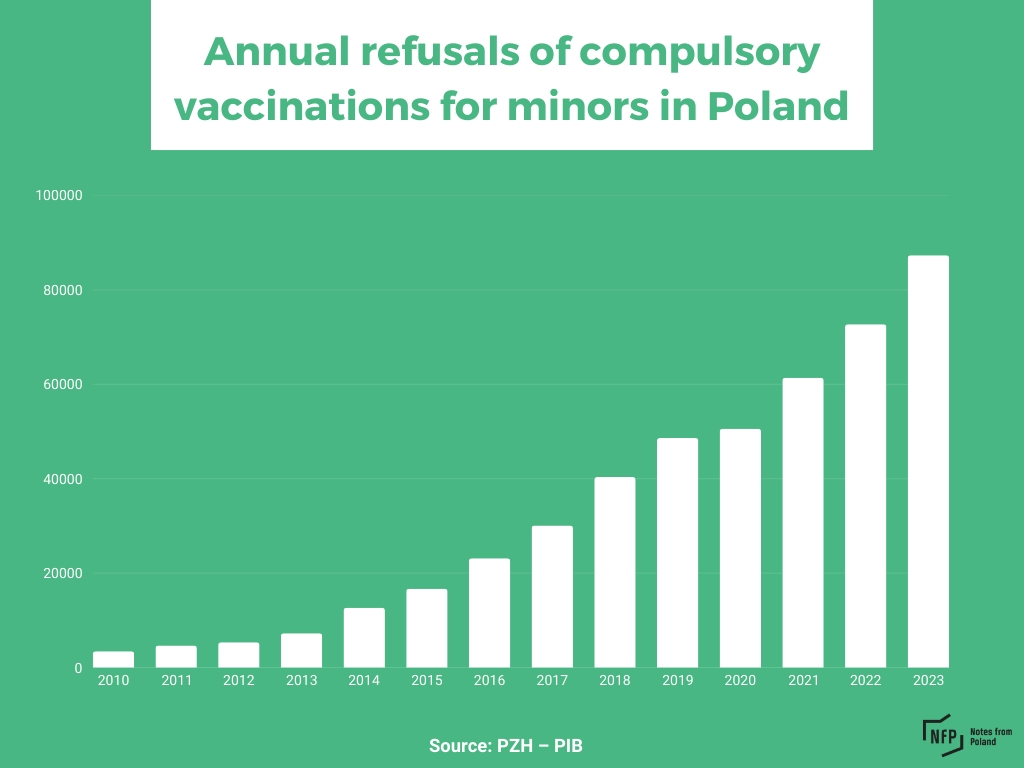A top Polish health official has suggested barring unvaccinated children from schools. The proposal comes after a serious diphtheria case in an unvaccinated child, raising alarm about the country’s declining vaccination rates.
Paweł Grzesiowski, Poland’s chief sanitary inspector, says the current system isn’t working. Parents can technically be fined for skipping mandatory vaccines, but the process takes years and is rarely enforced. He believes stricter rules are needed to protect public health.
The idea of restricting school access is controversial. Poland’s constitution guarantees the right to education, making a direct ban difficult. But health officials warn that without action, vaccine-preventable diseases could return.
A growing public health risk
Vaccine hesitancy has surged in Poland. In 2010, fewer than 4,000 parents refused vaccines for their children. By 2023, that number had soared to over 87,000.
As a result, vaccination rates for diseases like measles have dropped below safe levels. In recent years, Poland has seen a rise in measles cases, and now diphtheria has made a comeback.
The latest case involved a six-year-old child who returned from Africa and fell seriously ill. The child is now in a coma, and an adult who had close contact was also infected. Officials fear this could be a warning sign of worse outbreaks to come.
Legal battles ahead?
Grzesiowski believes denying school access to unvaccinated children could be an effective deterrent. But it’s not that simple. Education is a constitutional right in Poland, and any ban could face strong legal challenges.
Some lawmakers have proposed limiting access to nurseries and preschools for unvaccinated children. Others argue that parents should face stricter fines or legal consequences for failing to comply with vaccination laws.
Only children with legally required vaccinations would be admitted to public preschools and nurseries under a proposal put forward in the Senate and backed by a deputy health minister.
— Notes from Poland 🇵🇱 (@notesfrompoland) January 14, 2021
Since 2010, the number of parents refusing vaccines has risen 14-fold https://t.co/Qhd2f5ICCB
The debate is dividing public opinion. Supporters say tough measures are needed to prevent the spread of disease. Opponents argue that restricting education goes too far and may push parents further into vaccine skepticism.
Tracking unvaccinated children
To tighten enforcement, health officials are planning a massive inspection of vaccination records. Around 7.5 million children’s records will be reviewed, and the data will be digitized.

Currently, Poland still relies on paper records, making it difficult to track who is vaccinated. A digital system would allow authorities to monitor vaccination rates more effectively.
However, privacy concerns are already surfacing. The far-right Confederation party has criticized the move, urging parents to reject data-sharing. They see this as government overreach, while health officials insist it’s a necessary step.
Will education solve the problem?
Grzesiowski admits that restrictions alone won’t solve vaccine hesitancy. Many parents refuse vaccines because of misinformation and fear.
Social media has played a big role in fueling vaccine skepticism. Without strong public education, simply banning unvaccinated children from schools might deepen distrust.
Health experts say Poland needs a mix of solutions. Stricter rules, better enforcement, and widespread public awareness campaigns may be the best way to reverse the trend.